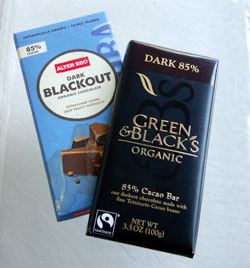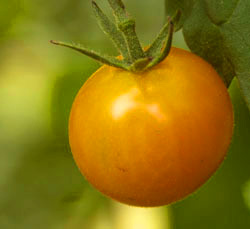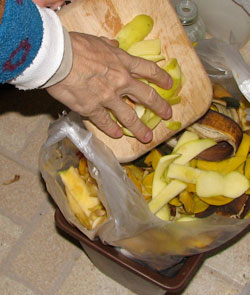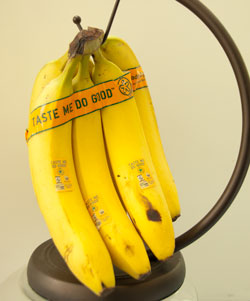Just food
 ©Janet Allen
©Janet Allen Our coffee choices matter!
Once we started learning about how our food is produced, we realized that it's not "just food," it's an issue of "just" food.
Food contributes to many if not most of the world's environmental and justice issues, and our food choices make a difference.
Coffee, as the second largest commodity in the world after oil, has a huge impact, so we try to be careful what coffee we buy.
Besides coffee, a few of the other foods that have an impact are: cocoa and chocolate, our fruits and vegetables— especially bananas— and food waste in general.
Cocoa
 ©Janet Allen
©Janet Allen Fair Trade organic chocolate
We were shocked to learn that child slavery exists in the cocoa industry, and that cocoa workers who do receive wages nevertheless live in poverty.
We always buy Fair Trade chocolate so we know that it wasn't produced using child labor and that workers received a fair price for their labor.
We also make sure it's organic, too.
(And, for our health, we choose the healthiest chocolate: 85% cacao.)
Produce
 ©Janet Allen
©Janet Allen One of our delicious golden cherry tomatoes
We were also shocked to learn that so many of the tomatoes we see in stores are produced right here in the US—by slave labor! It's not something we'd want to support, but we rarely buy supermarket tomatoes anyway since we have our own fresh tomatoes in our summer garden, then freeze extras for the winter.
For produce we don't grow ourselves, though, we try to buy as much produce from local farmers as possible. Although it's possible that large local farms could have migrant labor justice issues, smaller organic farms are less likely to have these issues.
Bananas
Bananas are another issue. In the past, we always bought organic bananas, not for health reasons (we don't eat the peel, after all), but because it protected Central American workers and their environment from getting sprayed with pesticides.
Now we're confused. I've read that organic bananas require continually chewing up more new rain forest since growing on "new" land is the only way they can be pesticide-free.
We're trying to buy bananas that are Fair Trade-certified, too. Wegmans doesn't carry bananas with this certification; we emailed Wegmans about the issue, but so far nothing has changed.
As much as we like bananas, we're going to reduce our consumption since even Fair Trade organic bananas may have too many problems associated with them. This is a tough challenge since we really enjoy having a banana at breakfast and a frozen banana in our smoothies!
The good news is that there are many other fruits that have more nutrition than bananas anyway, so we won't go hungry. We especially like dried fruits.
Food waste
 ©Greg Allen
©Greg Allen Some of our food scraps, destined to become vermicompost
Why is this subject on the "justice" page?
Because it seems terribly unjust that the developed world is wasting so much food when so many people (even in industrialized countries) don't have enough to eat. It's doubly unjust (not to mention unwise) that so much fossil fuel and abuse of our land and topsoil is used to grow food that is never eaten.
We cook in large quantities, so it's very normal for us to eat what people might call "leftovers." In fact, except for ad hoc meals such as stir fries with our summer produce, most of the time we choose to cook at any time other than meal time. Most of the kinds of things we cook are fine for days, or they even improve in flavor. And much of our "extras" are immediately frozen to enjoy another day.
 ©Janet Allen
©Janet Allen Leftovers is just food like any other food
At the worst, a few things that end up hiding in the back of the refrigerator get recycled into vermicompost, but in general we waste very little food.
We realize that some or possibly most of the 40% waste is wasted before it gets to the consumer, but to the extent that we opt out of the industrial food system by growing food ourselves or by buying locally, we're not participating in this upstream waste.
(And we seldom eat at restaurants or other places where we have no control over what is done with food, or with what is wasted, so we aren't participating in that part of the waste, either.)

 (Enlarge to see stickers)
(Enlarge to see stickers)